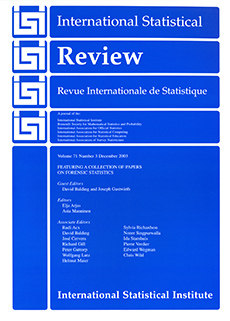Abstract
Two types of probability are discussed, one of which is additive whilst the other is non-additive. Popular theories that attempt to justify the importance of the additivity of probability are then critically reviewed. By making assumptions the two types of probability put forward are utilised to justify a method of inference which involves betting preferences being revised in light of the data. This method of inference can be viewed as a justification for a weighted likelihood approach to inference where the plausibility of different values of a parameter θ based on the data is measured by the quantity , where is the likelihood function and w(θ) is a weight function. Even though, unlike Bayesian inference, the method has the disadvantageous property that the measure q(θ) is generally non-additive, it is argued that the method has other properties which may be considered very desirable and which have the potential to imply that when everything is taken into account, the method is a serious alternative to the Bayesian approach in many situations. The methodology that is developed is applied to both a toy example and a real example.
Citation
Russell J. Bowater. "A Foundational Justification for a Weighted Likelihood Approach to Inference." Internat. Statist. Rev. 72 (3) 307 - 330, dec 2004.
Information




